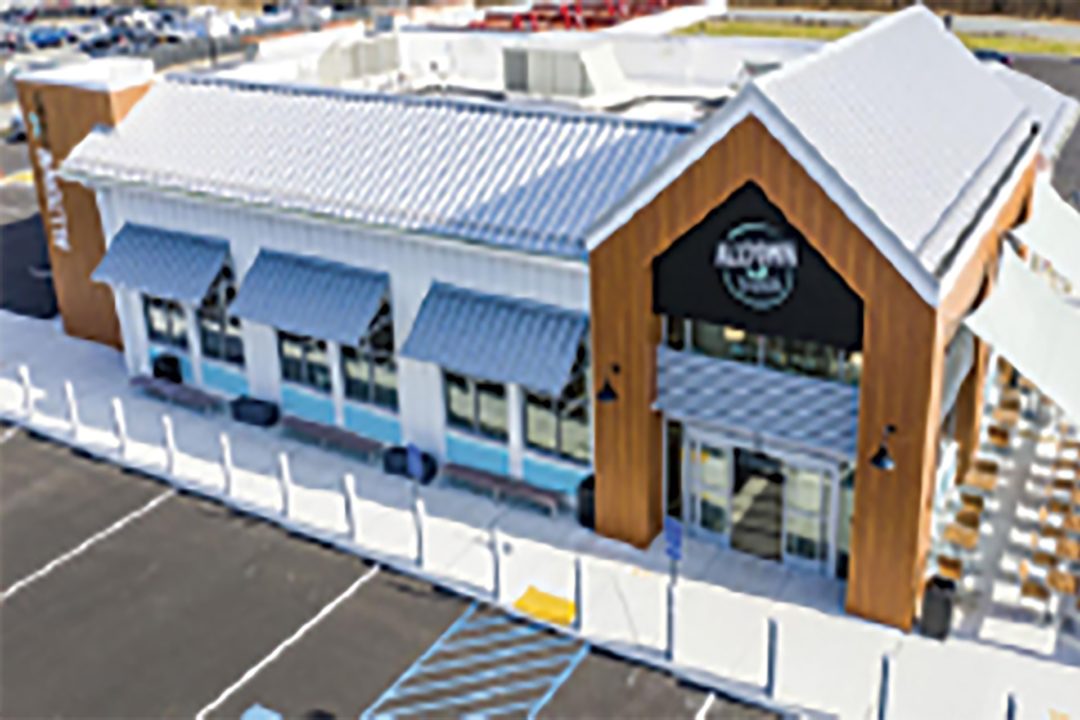By the ‘70s, small natural foods stores were popping up everywhere, and business was booming. As sales manager of a startup natural foods wholesale distributor in New England, I called on The Better Living Center, far north in Farmington, Maine—closer to the Canadian border than to Boston. Even though we were miles from any population center, midday, midweek, the store was packed with customers ordering 50-pound bags of Whitmer wheat berries and other bulk foods that our trucks would deliver the following week. There was a spirit of survival, a sense we were carving a path to a better life.
Deep BeliefThe owners of The Better Living Center, Dave and Betty, were not counterculture hippies. They were Seventh Day Adventists. The products they carried included Frank Ford’s Arrowhead Mills line of pesticide-free corn and wheat. Ford promoted stone-grinding grain for fresh bread, and maintaining the natural nutrition of the soil. Many natural foods stores at the time had their own stone mill grinders in the back room. Nationwide, growers, sellers and buyers believed deeply in these natural values, and one can trace the roots of today’s demand for sustainability and transparency back to the early days of the natural foods movement.
From within the movement, I don’t think anyone felt natural was a fad. Even though sales were immeasurably small, dwarfed by the mainstream food industry, there was an almost instinctive belief in the inevitability of our eventual success.
Related: Amazon-Whole Foods Two Years In
Defining SuccessAlltown Fresh is a new brand of convenience store that will soon be popping up all over New England. It’s an offshoot of the gas station, convenience store and wholesale fuel business of Global Partners LP, which currently operates nearly 1,600 gas stations in the Northeast, including Jiffy Mart, T-Bird and Xtra Mart brands. The first two Alltown Fresh locations are Auburn, NH, and Plymouth, MA, with Waterbury and Hamden, CT, next. The company owns and operates 74 New England Alltown-banner convenience stores with gas pumps, and hopes to convert all those with appropriate demographics to the Alltown Fresh banner (see photo).Reported earlier by Winsight Grocery Business, Global will position Alltown Fresh as a boutique grocery featuring fresh prepared natural foods. The company describes the offerings as “healthy, fresh food choices and organic, natural, vegan, vegetarian, gluten-free and locally sourced alternatives.”
The roughly 5,000-square-foot stores will contain indoor and outdoor seating to encourage neighbors to mingle, relax and hang out. Management hopes to attract parents seeking healthy options for kids, tech-savvy millennials wanting good nutrition to fuel their lifestyles, and everyone in between.
The café packages and prepares meals to order, with a handwritten menu straight out of a natural foods specialty store. Forage Porridge, for example, is a combination of quinoa, coconut milk, dried dates and cranberries, cashews and mint; Clean Green, a cage-free-egg or tofu sandwich topped with baby spinach, avocado and chia seeds; Green Smash, an avocado sandwich with pumpkin and chia seeds.
Customers will see the full on-site kitchen as chefs cook eggs to order, assemble protein bowls and sandwiches, with globally inspired flavors such as Korean kimchi. Groceries, local products, craft beer and traditional snacks are part of the mix, as are Wi-Fi, phone charging stations, electric vehicle fast chargers, a place to walk and relieve your pet, a dozen fuel pumps, and room for tractor-trailers.
We will see if Global hires culinary professionals, or makes the menu simple enough to train cooks in-house. But is there any clearer expression of American mainstream culture in 2019 than the corner convenience store? And when your local filling station exclusively features fresh-made natural organic foods, this is a reasonable definition of success.
Related: 2019 41st Annual Retailer Survey
Intimacy vs. EfficiencyNotice that Global management wants Alltown Fresh customers to interact—with each other, and with staff. Kitchens are visible, seating is available. This planned intimacy is the opposite of typical convenience store design and intent, which promotes quick in-and-out purchases. In a world that appears to be moving towards technology-enabled efficiency—think AmazonGo cashier-less grab-and-go stores, ordering online and picking up in store, or the least interactive of all, third-party delivery—Alltown Fresh promotes intimacy. Why? By far the strongest force in grocery retailing is competitive pricing pressure. With net profit margins of one or two percent, every grocer is looking for that extra tenth-of-one-percent savings by operating more efficiently.For a couple of decades, from the mid-1980s through the mid-2000s, Whole Foods Markets was blissfully free from competitive pricing pressures. The high-end retailer could command a premium for its unique, high-quality assortment. At its peak, management boasted spending nearly $400 per square foot to build its stores, compared to $150 to $200 for conventional supermarkets. But, as competition made its product mix less exclusive, Whole Foods’ customers shifted their shopping loyalties.
How will Alltown Fresh handle pricing? My guess is the chain’s pricing won’t ever be high enough to trigger a nasty nickname like Whole Foods’ “Whole Paycheck,” but neither will you see management diving to the bottom of the discount pool. At the margins, efficiency enables cost-savings, intimacy permits pricing power.The Pull of TechnologyIn an effort to compete with Amazon and keep up with new shopper expectations for food delivery, supermarket operators have been diverting investment from stores and building delivery infrastructure instead. Shifting resources from labor to technology will dilute the in-store shopping experience.
Retailers will be tempted to substitute technology for people. In its marketing materials, tech startup Birdzi promises to harness computer artificial intelligence and machine learning to push personalized health and wellness offers directly to customers’ smartphones. To be effective, the company assumes consumers will volunteer personal information: “By opting into the retailer’s program andself-identifying health conditions[emphasis added], food allergies and preferences, the customer can be guided to specific products across the store beneficial to them individually. This virtual shopping assistant can help customers when shopping both inside and outside the store, including guiding the shopper to the next beneficial product along the aisle.”
In order to make the technology work, the retailer will have to integrate its entire point-of-sale and other data systems into the new structure. According to the company, these personalized health and wellness recommendations will “…deliver contextually relevant, meaningful savings to each customer.” Uh huh.
Speaking at a recent conference on technology-enabled disruption, hosted by the Federal Reserve Bank of Dallas, Craig Boyan, president of H-E-B, the 340-store supermarket chain based in San Antonio, TX, said, “We believe the main thing we need to do is invest in people—and better people.”
Rather than use technology to eliminate jobs to send more money to shareholders, Boyan argued technology should focus on creating jobs and making customers’ and employees’ lives better. He criticized the billions of venture capital dollars flowing to profitless tech companies that put retailers out of business and thousands out of work.
Among H-E-B’s retail banners are 10 Central Markets, the company’s natural organic superstores; a convincing and successful competitor to Whole Foods and other premium natural organic retailers.
Related: Stress & Fatigue Drive Youth to Natural Early
The 2019 Business ModelOne product category Alltown Fresh will likely omit is vitamins and supplements. While the new convenience store concept promotes casual conversation, it does not present itself as a venue for nutritional counseling. Natural products retailers remain the best resource for nutritional expertise.As we confirmed in this year’s independent retailer survey (WholeFoods Magazine’s 41st Annual Retailer Survey, March, 2019), stores with more perishables and strong prepared foods programs grew fastest, had larger footprints, and were most bullish on expansion. Stores focusing on vitamins and supplements, while usually much smaller and growing more slowly, were still highly profitable.
Why We ShopThe New Food Economy, a non-profit news outfit reporting on food systems, interviewed Kevin Kelley, a store designer whose firm, Shook Kelley, helped Whole Foods clarify its unique identity between 2003 and 2007. At the time, increasing competition was threatening to obscure Whole Food’s brand message.
Kelley’s solution reduced and refocused store signage to simply communicate a feel-good, tongue-in-cheek hippie sanctimony.
Kelley’s store design approach starts with the question, “What is the problem you’re trying to solve through food?” Explaining, “It’s not just a refueling exercise—instead, what is the social, emotional issue that food is solving for us?” People make decisions to buy products based on concerns for health, safety, family and tradition that define who they are, Kelley says. The physical store experience can encourage and shape these decisions by capturing attention, stimulating the senses, and appealing to emotions bigger and more generous than simple thrift. Effective retailing, for Kelley, is about helping people navigate these personal hopes and fears. Above all else, Kelley says, retailers need to develop a food philosophy, a reason why they do this in the first place.
Related: Deep Missouri Roots Serve Retailer of the Year MaMa Jean’s
Putting It All TogetherOne of the most successful, and at 45 years old, longest-standing natural products retailers in the country is Cambridge Naturals, Cambridge, MA. Located near the urban center of Boston, Cambridge Naturals is perhaps surrounded by more supernatural competition per square mile than any other independent in the country. And yet, it thrives.Owner and co-founder Michael Kanter knows there’s no single trick of the trade. “You can’t do anything in isolation, you have to include everything. Your customers are as important as your curation, cleanliness, a store design that is attractive and compelling, and communicating your mission and message,” Kanter says. “The romance of how you present it is a significant influencer. There is no one thing; no ‘the best product,’ ‘the best pricing,’ if you don’t combine it with constantly training your staff to give awesome customer service. And always communicate your vision as an overall umbrella understanding that this is something more than just business to you; that you are sticking with it despite all the challenges.”
On reaching customers, Michael tells me, “It is important to know that you will not get everybody. People want to support local communities, but don’t always act on it, while others go out of their way to do that. You will not attract everyone. But for those whose views and values align with yours, your store will mean something to them,” providing them with emotional and physical support and sustenance. In other words, noble work.
P.S.Out of curiosity, I searched for health food stores in Farmington, Maine. Guess what? The Better Living Center is still there, carried on by new owners. Betty turns 90 this year.JJ










